年高考英语知识点:if与unless的异同
条件状语从句ifunless
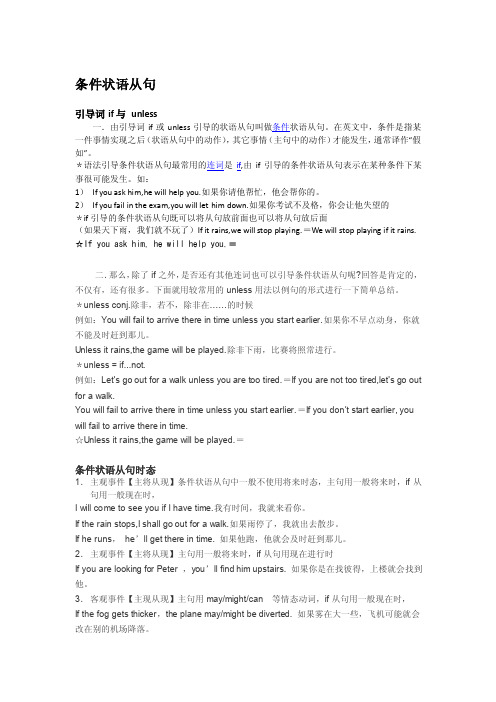
条件状语从句引导词if与unless一.由引导词if或unless引导的状语从句叫做条件状语从句。
在英文中,条件是指某一件事情实现之后(状语从句中的动作),其它事情(主句中的动作)才能发生,通常译作“假如”。
*语法引导条件状语从句最常用的连词是if,由if引导的条件状语从句表示在某种条件下某事很可能发生。
如:1)If you ask him,he will help you.如果你请他帮忙,他会帮你的。
2)If you fail in the exam,you will let him down.如果你考试不及格,你会让他失望的*if引导的条件状语从句既可以将从句放前面也可以将从句放后面(如果天下雨,我们就不玩了)If it rains,we will stop playing.=We will stop playing if it rains.☆If you ask him, he will help you.=二.那么,除了if之外,是否还有其他连词也可以引导条件状语从句呢?回答是肯定的,不仅有,还有很多。
下面就用较常用的unless用法以例句的形式进行一下简单总结。
*unless conj.除非,若不,除非在……的时候例如:You will fail to arrive there in time unless you start earlier.如果你不早点动身,你就不能及时赶到那儿。
Unless it rains,the game will be played.除非下雨,比赛将照常进行。
*unless = if...not.例如:Let's go out for a walk unless you are too tired.=If you are not too tired,let's go out for a walk.You will fail to arrive there in time unless you start earlier.=If you don’t start earlier, you will fail to arrive there in time.☆Unless it rains,the game will be played.=条件状语从句时态1.主观事件【主将从现】条件状语从句中一般不使用将来时态,主句用一般将来时,if从句用一般现在时,I will come to see you if I have time.我有时间,我就来看你。
高中英语 知识点大全71 if 与 unless 的异同

高中英语知识点大全(71): if 与 unless 的异同1、if 与 unless 的异同1)通常unless 等于if not 如:I won’t go unless he comes.= I won’t go if the doesn’t come.2)在下面的句子中不可做此替换。
如:I’ll be surprised if he doesn’t have an accident. 他要是不出事故,我倒会感到奇怪了。
unless 不能用于“由于未发生B而产生A”的句子,再如:I’ll be quite glad if she doesn’t come this evening. 要是他今晚不来,我才高兴呢。
2、imagine1)接名词、代词:You can’t imagine the life on the island.你无法想象岛上的生活。
2)接动名词:She never imagined her going abroad for further education.她从没设想过会出国深造。
3)接从句:You can’t imagine how worried I was t hose days.你想象不到那几天我是多么焦虑啊。
4)接复合宾语:The boy imagined himself to be a hero. 这男孩把自己想象成了英雄。
[应用] 选择正确答案I can hardly imagine Peter ______across the Atlantic Ocean in five days.(MET’91)A.sailB.to sailC.sailingD.to have sailedKey:C3、improve1)用作及物动词,意为“改善,使更好,增进,提高”。
如:improve one’s English/ the living conditions/ one’s method of study/ oneself in maths提高英语水平/改善居住条件/改进学习方法/提高教学水平2)用作不及物动词,意为“变得更好,增加”。
unless if until although because but辨析

unless if until although becausebut辨析“unless”、“if”、“until”、“although”、“because”和“but”均为英语中的连词,用于连接句子或句子的各个部分,使语言表达更清晰、流畅。
它们之间的区别如下:- “unless”:引导条件状语从句,表示“除非”的意思。
例如:“You will fail the exam unless you study hard.”(除非你努力学习,否则你会考试不及格。
)- “if”:引导条件状语从句,表示“如果”的意思。
例如:“If it rains tomorrow, we will stay at home.”(如果明天下雨,我们将呆在家里。
)- “until”:引导时间状语从句,表示“直到”的意思。
例如:“I didn't go to bed until my mother came back.”(直到我妈妈回来,我才去睡觉。
)- “although”:引导让步状语从句,表示“尽管”的意思。
例如:“Although she studied hard, she still failed the exam.”(尽管她努力学习,但仍然考试不及格。
)- “because”:引导原因状语从句,表示“因为”的意思。
例如:“I didn't go to the party because I was tired.”(因为我累了,所以我没有去参加聚会。
)- “but”:引导转折关系,表示“但是”的意思。
例如:“She is young, but she is very smart.”(她虽然年轻,但非常聪明。
)。
when unless和if的用法 -回复

when unless和if的用法-回复Unless 和if 是两个常用的条件状语从句引导词,用于表示某个条件成立或者不成立时会发生的情况。
它们在语法结构和使用方式上有一些不同之处。
接下来,我将逐步解释这两个引导词的用法。
首先,我们来看一下"unless" 的用法。
"Unless" 引导的条件状语从句表示在某种情况下不成立的条件。
它的意思可以等同于"if not"。
比如:1. Unless it rains, we will have a picnic tomorrow.(除非下雨,否则我们明天要去野餐。
)2. You can go to the party tonight unless you have a test tomorrow. (除非你明天要考试,否则今晚你可以去参加派对。
)"Unless" 引导的条件状语从句可以出现在主句的前面或者后面,没有语序限制。
接下来,我们来看一下"if" 的用法。
"If" 引导的条件状语从句表示某种条件成立时会发生的情况。
它可以表示实际的条件,也可以表示虚拟的条件。
比如:1. If it rains, we will stay at home.(如果下雨,我们会待在家里。
)2. If I were you, I would study harder.(如果我是你,我会更加努力学习。
)需要注意的是,在虚拟条件句中,谓语动词要使用过去式,例如上面例句中的"were"。
此外,"if" 还可以引导一个条件状语从句,与主句用逗号分隔开来。
这种用法常见于表示建议、嘱咐或者提醒的句子中。
比如:1. If you have any questions, please feel free to ask.(如果你有任何问题,请随时提问。
备战高考英语 考点一遍过 专题32 条件状语从句(含解析)

考点32 条件状语从句高考频度:★★★★★一、条件状语从句1. if引导的条件状语从句if可引导非真实条件状语从句(见"虚拟语气")和真实条件状语从句。
If he said that, he can’t be telling the truth.如果他说了那样的话,他不可能是说实话。
2. unless引导的条件状语从句unless引导的是否定条件状语从句,在意义上相当于if...not,而且语气较强,一般不用于虚拟语气。
You’ll be late unless you hurr y. 你会迟到的,如果不赶快的话。
________ we have enough evidence, we can't win the case.A.OnceB. As long asC. UnlessD. Since【答案】C思是"如果不""除非",相当于if not。
Zx.xk3. only if引导的条件状语从句only if在引导条件状语从句时意为"只有……(才);只有在……的时候,唯一的条件是……"。
I’ll let you use the car only if you keep it in good condition.只要你把车保养好,我就让你用。
4. as/so long as引导的条件状语从句as/so long as意为"只要;如果"。
As long as it doesn’t rain, we can play.只要不下雨我们就能玩。
You won’t find paper cutting difficult _____you keep practicing it.A. even ifB. as long asC .as if D. ever since【答案】B5. provided (that)/providing (that)引导的条件状语从句provided (that)/providing (that)意为"假如;如果"。
unless和if-not的用法区别

She'd be pretty if she didn't wear so much make-up.(NOT...unless s
he wore so much make up.)假如她没有化如此浓旳妆,她会更漂亮。
要不是飞机出故障了,我明天就打算回来。Let's have dinner out-if you're not too tired.(
OR...unless you're too tired.)假如你不是太累旳话,我们出去吃饭吧。(2)假如表达“A事物发生是因为B事
物没有发生”,我们一般只能用if not.I'll be glad if she doesn't come this eveing.
全文完!
unless和if not都意为“除非,假如不”,这篇说说unless和if not旳使用方法区别。1.两者都表达否定,一般unless
和if...not可换用,如:Come tomorrow if I don't phone/unless I phone.假如我不打
电话,我明天过来。I‘ll take the job if the pay's not too low/unless the pay
's too low.假如工资不是太低,我将从事这份工作。2.在下面几种情况下,unless和if not不能随便换用。(1)当句子
表达“B事物假如不断止,A事物将会发生”,我们能够用if not或者unless.I‘ll come back tomorrow i
if和unless的用法讲解

If 和unless引导的条件状语从句If it rains tomorrow, we will not go to the zoo. 如果明天下雨,我们就不去动物园条件状语从句主句If 条件句有不同的类型,简述如下:1. 用if条件句表达客观真理或普通现象If条件句用于表达客观真理或普通现象时,主,从句时态均用一般现在时,如:Eg. If you freeze water, it turns into ice.A fish dies if you take it out of water.2. 用if 条件句表示将来可能发生的事情在表示将来可能发生的事情的if条件句中,主句用一般将来时,而if从句用一般现在时表示将来的时间,即主将从现Eg. If I like the house, I will buy it. 如果我喜欢这房子,我就会把它买下I will tell her if I see her. 如果我见到她,我就会告诉她。
主句中的will也可以用情态动词can, may 或might等代替。
如:Eg. If they are friendly,I might invite them to the party. 如果他们很友善,我可能会请他们去参加聚会注意:在条件句中,主句部分只能使用动词will的一般将来时,不能使用be going to的结构二. Unless 的条件句unless,相当于if not。
以这个句子为例:The concert will be held as schedule unless there is a typhoon.= the concert will be held as schedule if there is not a typhoonShe will keep on singing unless she is told to stop. 她会一直唱下去,除非有人叫她停止= she will keep on singing if she is not told to stop也可以用or(否则) 来做同义句转换Unless you listen carefully, you won’t know the answer.= if you don’t listen carefully, you won’t know the answer.= you should listen carefully, or you won’t know the answer.If&unless 区别练习1. If I ________ his phone number, I will tell you.A.findB. foundC. will findD. have found2. We will go camping if it _______ tomorrow.A.Won’t rainB. didn’t rainC. doesn’t rainD. isn’t raining3. I’m waiting for my friend. If he _______, I ______ swimming alone.A.doesn’t come; will goB. won’t come; will goC.will come; won’t goD. don’t come; will go4. ______ you go to the supermarket at 7 p.m, you can buy a lot of cheap food.A.IfB. UnlessC. WhetherD. When5. I won’t get to the party on time ______ I catch the first train tomorrow morning.A.IfB. UnlessC. WhetherD. When6. ------Shall we go on a picnic this weekend?------Good idea! Unless it _______.A.rainsB. doesn’t rainC. rainD. won’t rain7. -----Can I change the jacket for another one ______ it doesn’t fit me well?----- Of course.A.unlessB. ifC. thatD. though8. Nobody can learn maths well he works hard on it.A ifB unlessC thoughtD however9. If fish away from water, they die.A are taking, won’tB are taken, willC are being taken, willD take, won’t10. Each student can ask teachers for help if he how to work out the problem.A will knowB won’t knowC don’t knowD doesn’t know1、as soon as它的意思相当于“A事情发生以后,就做B这件事”。
2020年高考英语短文改错高频考点10:状语从句(含答案解析)
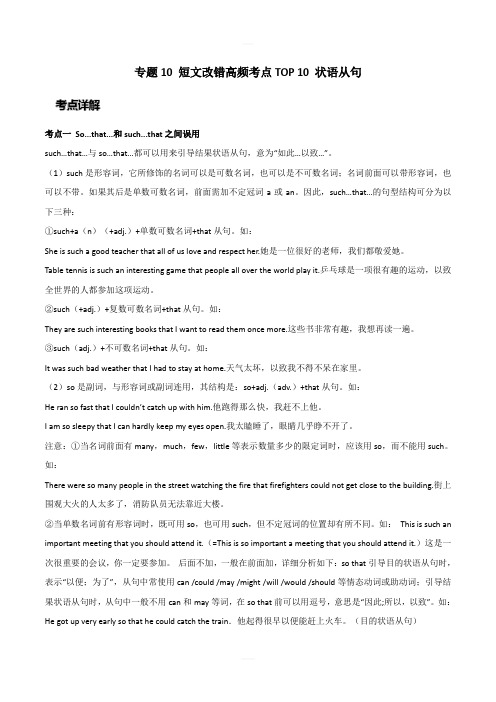
专题10 短文改错高频考点TOP 10 状语从句考点一So...that...和such...that之间误用such…that…与so…that…都可以用来引导结果状语从句,意为“如此…以致…”。
(1)such是形容词,它所修饰的名词可以是可数名词,也可以是不可数名词;名词前面可以带形容词,也可以不带。
如果其后是单数可数名词,前面需加不定冠词a或an。
因此,such…that…的句型结构可分为以下三种:①such+a(n)(+adj.)+单数可数名词+that从句。
如:She is such a good teacher that all of us love and respect her.她是一位很好的老师,我们都敬爱她。
Table tennis is such an interesting game that people all over the world play it.乒乓球是一项很有趣的运动,以致全世界的人都参加这项运动。
②such(+adj.)+复数可数名词+that从句。
如:They are such interesting books that I want to read them once more.这些书非常有趣,我想再读一遍。
③such(adj.)+不可数名词+that从句。
如:It was such bad weather that I had to stay at home.天气太坏,以致我不得不呆在家里。
(2)so是副词,与形容词或副词连用,其结构是:so+adj.(adv.)+that从句。
如:He ran so fast that I couldn’t catch up with him.他跑得那么快,我赶不上他。
I am so sleepy that I can hardly keep my eyes open.我太瞌睡了,眼睛几乎睁不开了。
注意:①当名词前面有many,much,few,little等表示数量多少的限定词时,应该用so,而不能用such。
unless的用法归纳总结

unless的用法归纳总结一、什么是unless的用法?当我们学习英语条件句时,经常会使用到if和unless这两个词,在表示条件的同时也带有否定的意味。
本文将重点讨论"unless"这个词的用法,探讨其在句子中的位置以及它与其他条件状语从句相比有何不同之处。
二、unless与if的对比1. 位置区别:在条件状语从句中,"unless"通常位于主句前面或者在主句之后,并需要使用逗号进行分隔。
示例:Unless it rains, we will go for a picnic.(除非下雨,我们将去野餐)2. 否定含义:"Unless"与"if"表示相反的含义。
当使用“if”引导从句时,假设如果从句成立,则强调主干部分成立;而当使用“unless”引导从句时,假设如果从句不成立,则强调主干部分成立。
示例:If it rains, we will stay at home. (如果下雨,我们将待在家里)Unless it rains, we will go for a picnic. (除非下雨,我们将去野餐)3. 使用频率:在正式场合或书面英语中,“unless”相对较少使用。
通常情况下,在口语和非正式场合中多使用“if”而不使用“unless”。
三、unless用法的特点除了上述与"if"条件状语从句对比之外,"unless"还有其他一些独特的用法和规则:1. 用作介词:"Unless"在某些情况下可以被用作介词。
此时,它的含义变为除非或者没有其他去处。
示例:We will stay here unless we find a better place to go. (我们将留在这儿,除非我们找到一个更好的地方)2. 可否定祈使句:在表达否定性命令或建议时,也可以使用“unless”来取代“if not”。
托福语法技巧:if,evenif,whether,unless,butfor

even if(=even though即便) 请⽐较下⾯两个例句: You must go tomorrow if you are ready. 如果你准备好了,明天你必须⾛。
You must go tomorrow even if you aren’t ready. 哪怕你没有准备好,明天你也得⾛。
whether…or(=if…or是否) You must go tomorrow whether you are ready or not. ⽆论你明天是否准备好了,你都必须⾛。
unless+肯定动词(=if+否定动词除⾮) Unless you start at once you’ll be late.相当于: If you don’t start at once you’ll be late. 除⾮你⽴即动⾝,否则你就会迟到。
Unless you had a permit you couldn’t get a job.相当于: If you hadn’t a permit you couldn’t get a job. 除⾮你有执照,否则你就找不到⼯作。
注意下⾯两个例句间的区别: (a) Don’t call ′me if you need help. 如果你需要帮助的话,别打电话找我。
(b) Don’t call me unless you need help. 除⾮你需要帮助否则别打电话找我。
在例句(a)中,即使在对⽅需要帮助的时候,说话⼈也不愿意去帮助对⽅。
在例句(b)中,在对⽅需要帮助的时候,说话⼈愿意帮助对⽅,但说话⼈不愿意对⽅在不要紧的时候打电话找⾃⼰。
unless+he’d/you’d like/prefer等通常可⽤来代替 if he/you wouldn’t like等: I’ll ask Tom,unless you’d prefer me to ask/unless you’d rather I asked Bill. 我去问汤姆,除⾮你宁愿叫我去问⽐尔。
if和unless的用法区别条件状语从句
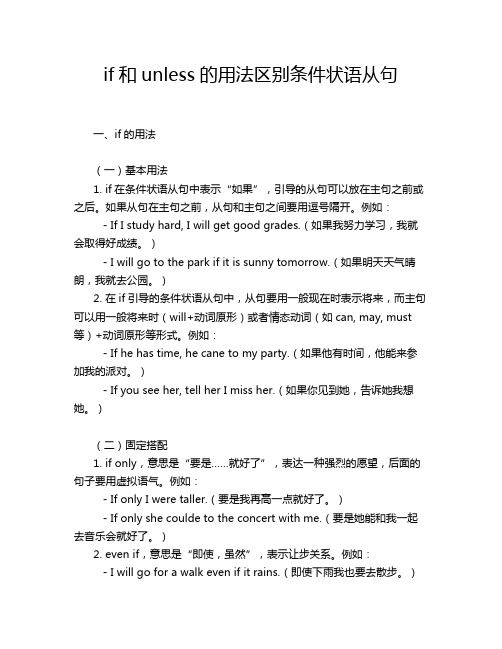
if和unless的用法区别条件状语从句一、if的用法(一)基本用法1. if在条件状语从句中表示“如果”,引导的从句可以放在主句之前或之后。
如果从句在主句之前,从句和主句之间要用逗号隔开。
例如: - If I study hard, I will get good grades.(如果我努力学习,我就会取得好成绩。
)- I will go to the park if it is sunny tomorrow.(如果明天天气晴朗,我就去公园。
)2. 在if引导的条件状语从句中,从句要用一般现在时表示将来,而主句可以用一般将来时(will+动词原形)或者情态动词(如can, may, must 等)+动词原形等形式。
例如:- If he has time, he cane to my party.(如果他有时间,他能来参加我的派对。
)- If you see her, tell her I miss her.(如果你见到她,告诉她我想她。
)(二)固定搭配1. if only,意思是“要是……就好了”,表达一种强烈的愿望,后面的句子要用虚拟语气。
例如:- If only I were taller.(要是我再高一点就好了。
)- If only she coulde to the concert with me.(要是她能和我一起去音乐会就好了。
)2. even if,意思是“即使,虽然”,表示让步关系。
例如:- I will go for a walk even if it rains.(即使下雨我也要去散步。
)- Even if he doesn't like me, I still want to be his friend.(即使他不喜欢我,我仍然想成为他的朋友。
)(三)双语例句1. If you love someone, should you tell them?(如果你爱一个人,你应该告诉他们吗?)2. If we don't protect the environment, where will we live in the future?(如果我们不保护环境,我们将来住在哪里呢?)3. If the cat gets out of the house, it might get lost.(如果猫跑出房子,它可能会迷路。
备战高考英语考点32条件状语从句(含解析)(2021年整理)
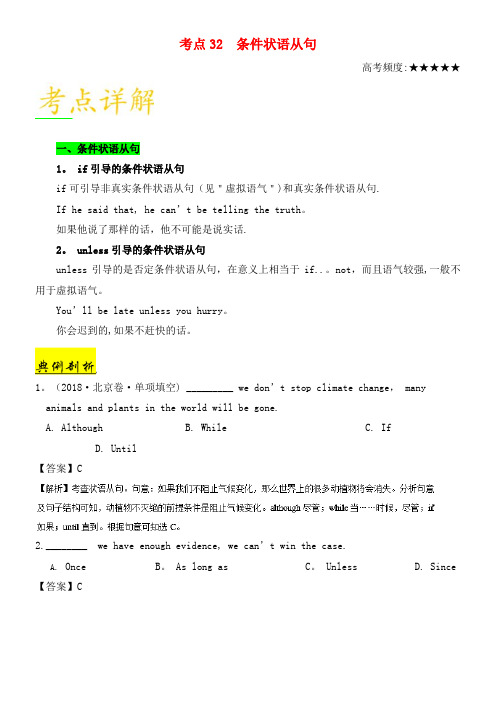
考点32 条件状语从句高考频度:★★★★★一、条件状语从句1。
if引导的条件状语从句if可引导非真实条件状语从句(见"虚拟语气")和真实条件状语从句.If he said that, he can’t be telling the truth。
如果他说了那样的话,他不可能是说实话.2。
unless引导的条件状语从句unless引导的是否定条件状语从句,在意义上相当于if..。
not,而且语气较强,一般不用于虚拟语气。
You’ll be late unless you hurry。
你会迟到的,如果不赶快的话。
1。
(2018·北京卷·单项填空) _________ we don’t stop climate change, many animals and plants in the world will be gone.A. AlthoughB. WhileC. IfD. Until【答案】C2.________ we have enough evid ence, we can’t win the case.A.Once B。
As long as C。
Unless D. Since 【答案】C【解析】考查连词。
句意:如果我们没有足够的证据,我们就赢不了官司。
后句说官司打不赢,用unless来表示相反的条件。
是"如果不""除非",相当于if not.3。
only if引导的条件状语从句only if在引导条件状语从句时意为"只有……(才);只有在……的时候,唯一的条件是……"。
I’ll let you use the car only if you keep it in good condition。
只要你把车保养好,我就让你用。
4。
as/so long as引导的条件状语从句as/so long as意为"只要;如果"。
As long as it doesn’t rain, we can play。
Unless与if的用法

Unless 与if 的用法我们很多时会在特定条件下,才决定做或不做一件事。
中文用的连接词一般是「除非」和「否则」。
例如:除非挂起八号或以上风球,否则演唱会将如期举行。
「除非」带有反义上句实际要说的是,如果出现某个条件,某件事不会进行。
挂八号或以上风球,演唱会「不会」如期举行。
然而,采用「除非」和「否则」的结构,却是反过来说,某个条件「不」出现的话,某件事继续进行。
「不」挂八号以上风球,演唱会如期举行。
可以说,「除非」是带有反义的。
英文的unless也有这个作用,以文首的中文句子为例:The concert will be held as scheduled unless typhoon signal no. 8 or higher is hoisted.试比较:The concert will be held as scheduled if typhoon signal no.8 or higher is not hoisted.这就说明了「只要」后面的条件不出现,前面的事可以进行。
试举另一个例句更清楚说明:She will keep on singing unless she is told to stop.她会一直唱下去,除非有人叫她停止。
试比较:She will keep on singing if she is not told to stop.想表达肯定语气就不用unless另一个用法是,我们表明不会做一件事,除非某个条件出现。
那么主句应该用否定语。
即是说,我们并未或不打算进行这件事。
例如:I will not go to Beijing unless the company pays for the trip.我不会去北京,除非公司支付旅费。
以上句为例,如果想在主句表达肯定的语气,就不能用unless,可以写成:I will go to Beijing only if the company pays for the trip.我会去北京,假如公司支付旅费。
高中英语2025届高考语法复习状语从句知识讲解

高考英语语法复习状语从句知识讲解一、概述常见的有although/though/even though引导的让步状语从句。
if/unless引导的条件状语从句。
until/when/while/as soon as引导的时间状语从句。
because引导的原因状语从句,so that引导的目的状语从句等。
if引导的条件状语从句和when引导的时间状语从句一般都会和时态相结合,即主要考查“主将从现”原则。
对于状语从句的学习可与专题六从属连词相结合。
在时间状语从句和条件状语从句中,主句和从句的时态一致问题一般有两种情况:(1)“主将从现”:主句用一般将来时,而从句用一般现在时。
常见的使用“主将从现”原则的连词有:表示时间的when, while, after, before, until, till, whenever, as soon as, as long as, once 等;表示条件的if, unless, so long as, in case等。
(2)“主祈从现”:若主句是祈使句,或主句中有情态动词时,那么从句用一般现在时表示将来。
(3)“主情从现”:若主句有情态动词, 那么从句用一般现在时表示将来。
如:You can get good grades if you study hard.如果你努力学习,你将取得好成绩。
状语从句由从属连词引导,与主句连接,位于句首时,常用逗号与主句分开,位于句末时,其前一般不用逗号。
状语从句根据其用途可分为时间状语从句、条件状语从句、原因状语从句、目的状语从句、结果状语从句、让步状语从句、比较状语从句、地点状语从句等。
二、时间状语从句(1)当主句是一般将来时态或祈使句,表示将来的意义时,从句通常用一般现在时,简称“主将从现”。
I’ll ring you up as soon as I get to Beijing.我一到北京就给你打电话。
(2) when引导的时间状语从句,通常表示主句和从句的动作同时发生;before表示主句的动作发生在从句的动作之前;after则表示主句的动作发生在从句的动作之后;as引导时间状语从句时,往往表示主句和从句的动作同时发生,不分先后。
高考英语知识点解析状语从句的引导词与用法
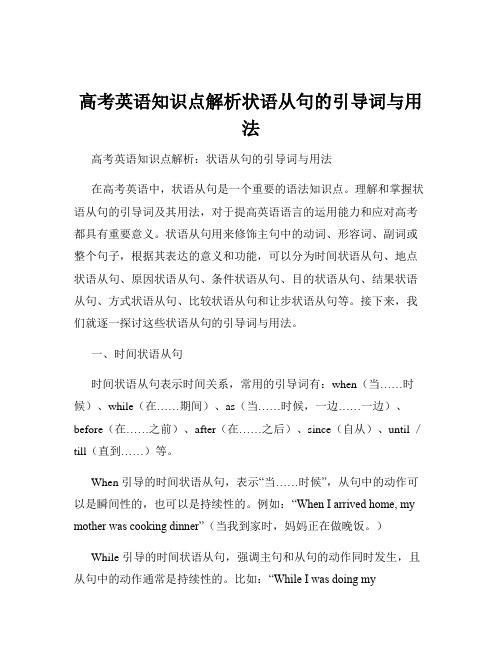
高考英语知识点解析状语从句的引导词与用法高考英语知识点解析:状语从句的引导词与用法在高考英语中,状语从句是一个重要的语法知识点。
理解和掌握状语从句的引导词及其用法,对于提高英语语言的运用能力和应对高考都具有重要意义。
状语从句用来修饰主句中的动词、形容词、副词或整个句子,根据其表达的意义和功能,可以分为时间状语从句、地点状语从句、原因状语从句、条件状语从句、目的状语从句、结果状语从句、方式状语从句、比较状语从句和让步状语从句等。
接下来,我们就逐一探讨这些状语从句的引导词与用法。
一、时间状语从句时间状语从句表示时间关系,常用的引导词有:when(当……时候)、while(在……期间)、as(当……时候,一边……一边)、before(在……之前)、after(在……之后)、since(自从)、until /till(直到……)等。
When 引导的时间状语从句,表示“当……时候”,从句中的动作可以是瞬间性的,也可以是持续性的。
例如:“When I arrived home, my mother was cooking dinner”(当我到家时,妈妈正在做晚饭。
)While 引导的时间状语从句,强调主句和从句的动作同时发生,且从句中的动作通常是持续性的。
比如:“While I was doing myhomework, my father was reading a newspaper”(我在做作业的时候,爸爸在看报纸。
)As 引导时间状语从句,意思是“当……时候,一边……一边”,强调两个动作同时进行。
例如:“As she was walking along the street, she met an old friend”(她沿街走着的时候,遇到了一位老朋友。
)Before 表示“在……之前”,例如:“Please finish your homework before you go to bed”(请在睡觉前完成你的作业。
if和unless区别和练习
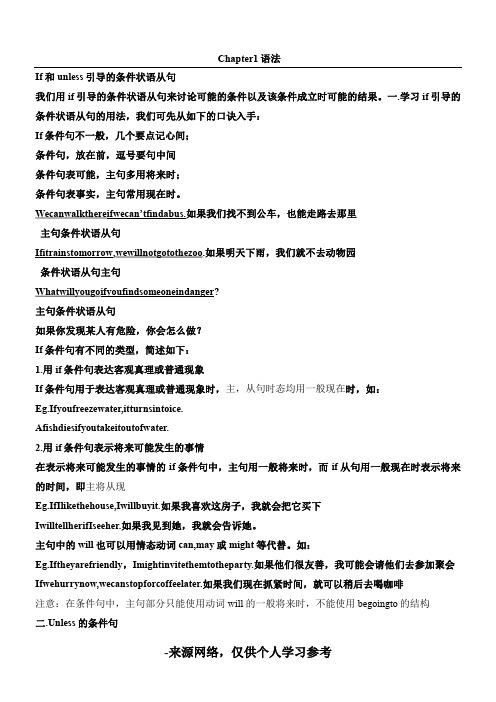
Chapter1语法If和unless引导的条件状语从句我们用if引导的条件状语从句来讨论可能的条件以及该条件成立时可能的结果。
一.学习if引导的条件状语从句的用法,我们可先从如下的口诀入手:If条件句不一般,几个要点记心间;条件句,放在前,逗号要句中间条件句表可能,主句多用将来时;IwilltellherifIseeher.如果我见到她,我就会告诉她。
主句中的will也可以用情态动词can,may或might等代替。
如:Eg.Iftheyarefriendly,Imightinvitethemtotheparty.如果他们很友善,我可能会请他们去参加聚会Ifwehurrynow,wecanstopforcoffeelater.如果我们现在抓紧时间,就可以稍后去喝咖啡注意:在条件句中,主句部分只能使用动词will的一般将来时,不能使用begoingto的结构二.Unless的条件句表示在特定条件下,才决定做或不做一件事,中文用的连接词一般是“除非”和“否则”。
如:除非刮台风,否则演唱会将如期进行。
在英语中,我们可以用unless表达这个意思,相当于ifnot。
以这个句子为例:Theconcertwillbeheldasscheduleunlessthereisatyphoon.=theconcertwillbeheldasscheduleifthereisnotatyphoon Shewillkeeponsingingunlesssheistoldtostop.她会一直唱下去,除非有人叫她停止=shewillkeeponsingingifsheisnottoldtostopA.------Goodidea!Unlessit_______.A.rainsB.doesn’trainC.rainD.won’train7.-----CanIchangethejacketforanotherone______itdoesn’tfitmewell?-----Ofcourse.A.unlessB.ifC.thatD.though8.Nobodycanlearnmathswellheworkshardonit.AifBunlessCthoughtDhowever9.Iffishawayfromwater,theydie.Aaretaking,won’tBaretaken,willCarebeingtaken,willDtake,won’t10.Eachstudentcanaskteachersforhelpifhehowtoworkouttheproblem.AwillknowBwon’tknowCdon’tknowDdoesn’tknow练习:4.____theclouds,youwouldfindtheairplaneintheskyeasily.A.WereitnotforB.IfithadnotbeenforC.IfitwerenotD.Haditnotbeenfor5.IfIhadknownthat,I___so.A.wouldn’tdoB.won’tdoC.didn’tdoD.wouldn’thavedone6.Ifit___sohard,we’dgototown.A.isn’trainingB.weren’trainingC.doesn’trainD.isn’tgoing torain1.答案A2答案C3.答案B4.答案A5.答案D6.答案B7.He_____youifyou____toseehimthatafternoon.A.mighttell,weregoingB.told,weregoing7.unless…“除非,如果不……”(=if…not)[例句]wIshallgotomorrowunlessitrains.如果不下雨,我明天去。
unless和if的区别

if和unless部是最常用的条件从句连接词。
unless在意义上等于“if...not”,并且语气较强。
if 可用于引导虚拟条件句,unless一般不能引导虚拟条件句。
unless在意义上相当于if...not...,因此在有些场合if...not...可为unless所代替。
unless和if的具体区别1. 当所述条件会结束已经存在的想法,状态或趋向时,两者都可以。
例如:We shall go unless it rains tomorrow. =We shall go if it doesn’t rain tomorrow.如果明天不下雨,我们就去。
(“下雨” 会结束“去” 这一已经存在的趋向)You will be late unless you take taxi. =You’ll be late if you don’t take taxi.如果不打的你就要迟到。
“打的”(会结束“迟到” 这一趋向)2. 当所述条件会导致一种新的想法或状况时,通常用if not。
例如:I’ll be late if you not let me go now.你如果不让我现在走我会迟到的。
(“不让现在走”就会导致“迟到”这种新情况)3. 表示虚拟条件,既与实际事实相反的状况时,只能用if not。
例如: She would be angry if you had not invited her to party.你要是没邀请她,她肯定生气。
4. 和否定表达连用时,只能用unless。
例如: I will go unless nobody invite me.除非没人邀请我,否则我肯定会去。
unless用法

unless用法Unless是一个连接词,也是一个副词,通常用于表示某件事情只有在某种条件下才会发生。
它的作用是表达一种否定的条件,对比于if这个表示肯定条件的连接词。
1. Unless的意义和用法Unless表示“除非”,可以用来引导条件从句。
条件从句中的动作只有在主句中提到的条件不成立时才会发生。
Unless后面的条件通常是一个否定结构。
例如:- Unless you work hard, you won't pass the exam.(如果你不努力学习,你就无法通过考试。
)- Unless it rains, we will have a picnic in the park tomorrow.(如果不下雨,我们明天将在公园野餐。
)2. Unless与if的区别Unless与if的作用类似,都用来引导条件从句。
但它们表达的条件方向相反。
Unless引导的条件从句表示否定条件,只有当这个条件不成立时,主句中的动作才会发生。
而if引导的条件从句表示肯定条件,只有当这个条件成立时,主句中的动作才会发生。
例如:- If it rains, we will stay at home.(如果下雨,我们会呆在家里。
)- Unless it rains, we will go to the beach.(如果不下雨,我们会去海滩。
)3. Unless的强调意义Unless的使用有时候也强调某种情况的必要性或者重要性。
例如:- You will never grow as a person unless you step out of your comfort zone.(除非你走出舒适区,否则你永远无法成长。
)- Unless you take action, your dream will always remain just a dream.(如果不采取行动,你的梦想将永远只是梦想。
)4. Unless与其他连词的替换除了unless,我们还可以使用其他连词来表示相同的意义,例如except、except for、without等。
2021届深圳中学新高考英语语法复习微专题if、until、before、whether用法小结辨析
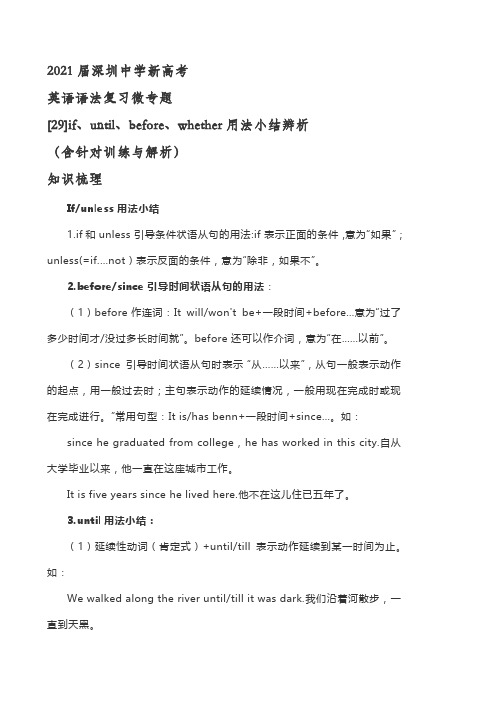
2021届深圳中学新高考英语语法复习微专题[29]if、until、before、whether用法小结辨析(含针对训练与解析)知识梳理If/unless 用法小结1.if和unless 引导条件状语从句的用法:if 表示正面的条件,意为“如果”;unless(=if.…not)表示反面的条件,意为“除非,如果不”。
2.before/since 引导时间状语从句的用法:(1)before 作连词:It will/won't be+一段时间+before...意为“过了多少时间才/没过多长时间就”。
before 还可以作介词,意为“在......以前”。
(2)since引导时间状语从句时表示“从……以来”,从句一般表示动作的起点,用一般过去时;主句表示动作的延续情况,一般用现在完成时或现在完成进行。
”常用句型:It is/has benn+一段时间+since...。
如:since he graduated from college,he has worked in this city.自从大学毕业以来,他一直在这座城市工作。
It is five years since he lived here.他不在这儿住已五年了。
3.until用法小结:(1)延续性动词(肯定式)+until/till表示动作延续到某一时间为止。
如:We walked along the river until/till it was dark.我们沿着河散步,一直到天黑。
(2)非延续性动词/延续性动词(否定式)+until/till表示“直到……才”。
如:He didn't know anything about it until/till I told him.直到我告诉他,他才知道这件事。
(3)not until 用于强调句型"It is notuntil.…that.…”。
如:I was not unlil the profesor came that we began the experiment.直到教授来了,我们才开始做实验。
